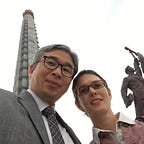Multi-Entry Special Validation Passports Extended to Two Years
Since September 2017, U.S. citizens have been restricted from traveling to North Korea. Otto Warmbier’s tragic detention and consequential death, led to the U.S. State Department issuing a Geographic Travel Restriction (GTR) to the DPRK for all U.S. citizens. Only select humanitarian organizations, reporters, and other individuals in the interest of the State Department are allowed to apply for Special Validation Passports, which allow U.S. citizens to travel into the DPRK. North Korea, in fact, is the only country in the world for which such a U.S. travel restriction is issued. State’s official reason for this restriction is to protect U.S. citizens from undue harm or detainment, despite less than a 0.2% probability of being detained in the country.
Then two years after the GTR, the COVID pandemic hit. Now more than four years have passed since North Korea closed its borders, restricting travelers from both leaving and entering the country. At the end of 2023, North Korea slowly started to reopen its borders and reengage with the international community, but only a select number of foreign groups have since been allowed to visit the country. North Korea is currently focusing on bringing their own citizens home from international assignments after being stranded abroad these past four years.
Humanitarian organizations have also not been allowed to re-enter the country. Even UN entities such as UNICEF, the World Health Organization (WHO), and World Food Program (WFP) have yet to return to the DPRK. With North Korea’s highly selective reopening, it is unclear when they and the larger international community will be able to enter.
Unfortunately, pandemic measures, including border closings, plus six years of global sanctions have taken their toll on everyday life in North Korea. For example, scalpels, needles, and other basic medical equipment are in low supply. For this reason, North Korea’s January 2024 Supreme Assembly speech focused on improving the development of the country, particularly enhancing infrastructure in the provinces and towns outside the capital city. This development is crucial as up to 41% of people within the country are still vulnerable and in need of both humanitarian assistance and economic development.
As a result, both IGNIS Community’s medical and humanitarian teams recently applied for Special Validation Passports (SVP) to re-enter North Korea. On May 2, 2024 all eight applicants successfully received their SV passports from the U.S. State Department. This time these passports have been extended to be good for multiple trips in and out of North Korea over the span of two years.
Prior to 2024, Special Validation Passports to the DPRK were only valid for one year. Extending passport validity to two years is a significant improvement. Being able to travel to North Korea multiple times for two years enables humanitarian organizations’ to properly assess and address needs on the ground in a timely fashion without tedious and unnecessary red tape each time an organization visits the DPRK. Most importantly, by permitting humanitarian organizations the ability to respond to time-sensitive urgent needs, lives of ordinary North Koreans can be drastically improved.
Thus, IGNIS Community aims to return to North Korea within the year. Already various groups have visited the DPRK for the April Holiday, as well as German and Swedish diplomat delegations to inspect the condition of their embassies. Although exactly when or how the DPRK will reopen its borders for the wider international community is still unknown, IGNIS Community has prepared in advance for this possibility by obtaining necessary licenses and permits to continue its humanitarian engagement within the country.
